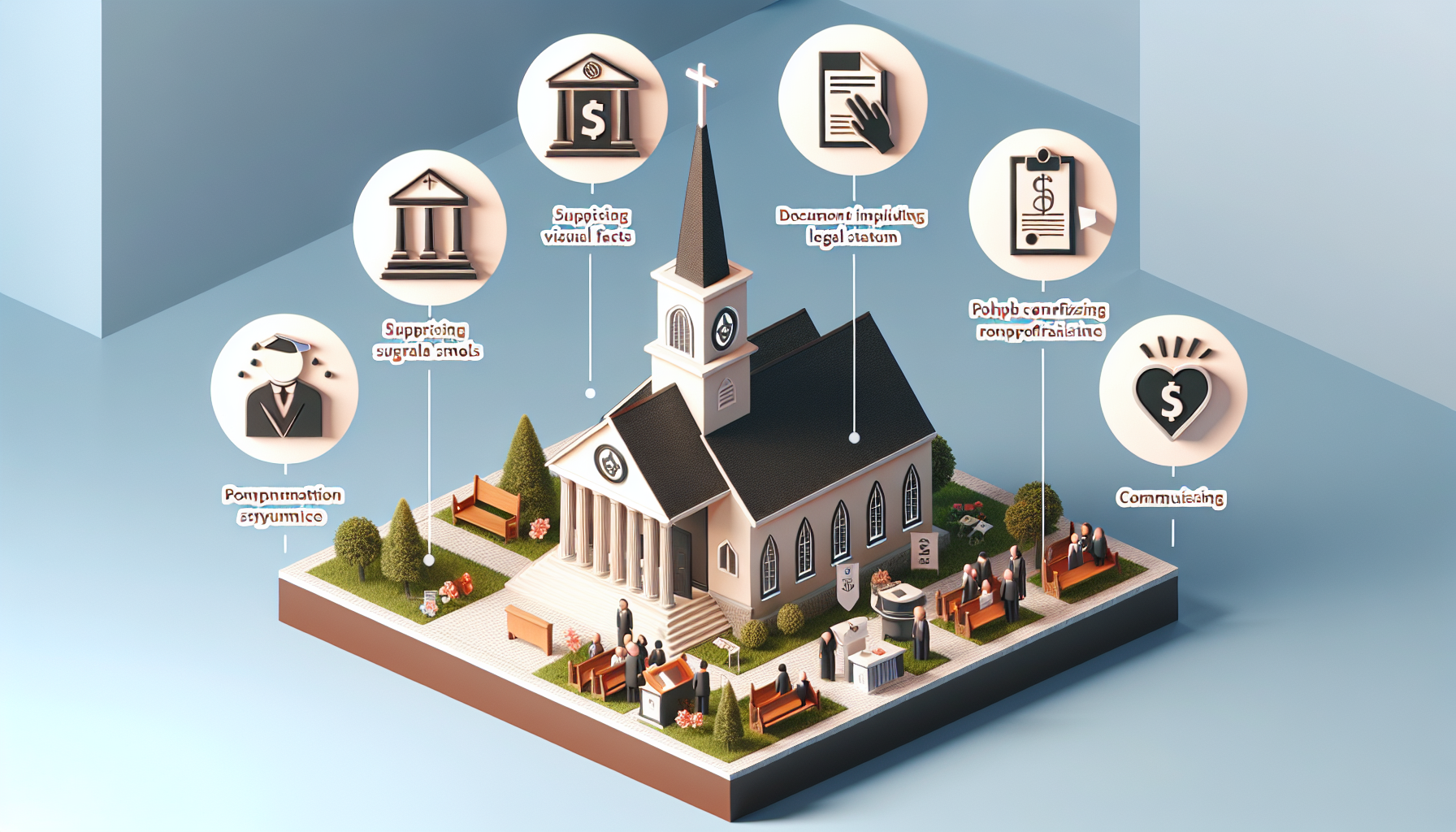Many people wonder if a church qualifies as a nonprofit organization. This question comes with various opinions and misconceptions. Understanding the differences between nonprofits and churches can be confusing. Churches often operate like nonprofits, but there are key distinctions. This blog post will explore what defines a nonprofit, the characteristics that set them apart, and how churches fit into this category.
- Defining nonprofits: Learn what makes an organization a nonprofit.
- Key characteristics: Discover the traits that define nonprofit organizations.
- Churches and nonprofits: Understand the relationship between churches and nonprofit status.
Understanding the Basics of Nonprofits
Nonprofit organizations play a crucial role in society. They aim to serve the public good rather than make a profit. These organizations can focus on various causes like education, health, or community service. The main goal is to help others and improve lives.
Most nonprofits rely on donations, grants, and fundraising events to support their missions. They often have tax-exempt status, meaning they don’t pay income taxes on the money they receive. This allows more funds to go directly toward their programs and services.
By understanding the basics of nonprofits, individuals can better appreciate the valuable work these organizations do in their communities.
What Defines a Nonprofit?
A nonprofit is an organization that operates without the intention of making a profit. Instead, it focuses on fulfilling a specific mission or purpose. To qualify as a nonprofit, an organization must meet certain criteria, such as being registered with the government and adhering to specific regulations.
Nonprofits can take various forms, including charities, foundations, and social advocacy groups. They often seek tax-exempt status under section 501(c)(3) of the Internal Revenue Code. This designation allows them to receive donations that are tax-deductible for the donor.
In essence, a nonprofit’s primary goal is to benefit society rather than generate profits for owners or shareholders. This fundamental difference sets nonprofits apart from traditional businesses.
Key Characteristics of Nonprofit Organizations
Nonprofit organizations share several key characteristics that distinguish them from for-profit entities. Here are some essential traits:
-
Mission-driven: Nonprofits exist to serve a specific cause or community need, focusing on social welfare, education, or health.
-
Tax-exempt status: Many nonprofits qualify for tax exemptions, allowing them to allocate more resources to their missions.
-
Funding sources: Nonprofits typically rely on donations, grants, and fundraising efforts rather than selling products or services for profit.
-
Governance: Most nonprofits are governed by a board of directors, ensuring transparency and accountability in decision-making.
-
Volunteers: Many nonprofits depend on volunteers to help carry out their missions, fostering community involvement and support.
These characteristics create a unique framework that enables nonprofits to thrive while serving their communities.
The Legal Status of Churches
Understanding the legal status of churches is essential for grasping their role as nonprofits. In many countries, including the United States, churches are often recognized as nonprofit organizations. This recognition allows them to operate without paying federal income taxes and to receive tax-deductible donations. However, this status depends on specific criteria that churches must meet.
Churches typically have a distinct legal standing because they are considered religious entities. This classification can sometimes lead to misconceptions about their nonprofit status. By examining how churches fit into the nonprofit framework, one can better understand their unique position in society.
Are Churches Automatically Nonprofits?
Many people assume that all churches are automatically classified as nonprofits. While it’s true that most churches enjoy nonprofit status, this isn’t always guaranteed. To be recognized as a nonprofit, a church must comply with specific regulations set by the IRS and state laws.
For instance, churches need to be organized exclusively for religious purposes and must not engage in activities that benefit private interests. Additionally, they must adhere to certain operational guidelines. If a church meets these criteria, it can apply for tax-exempt status under section 501(c)(3) of the Internal Revenue Code, which solidifies its nonprofit classification.
How Do Churches Obtain Nonprofit Status?
To obtain nonprofit status, churches must follow a series of steps. First, they need to establish a formal organization, which typically involves creating articles of incorporation and bylaws. These documents outline the church’s purpose and structure.
Next, churches must apply for tax-exempt status with the IRS. This process includes completing Form 1023, which requires detailed information about the church’s activities, finances, and governance. Once approved, the church receives a determination letter confirming its nonprofit status.
It’s important for churches to maintain compliance with ongoing requirements, such as filing annual reports and adhering to operational guidelines. By following these steps, churches can secure their nonprofit status and continue serving their communities effectively.

Financial Aspects of Churches
The financial aspects of churches are critical to their operations and sustainability. Churches often operate on tight budgets, relying heavily on donations and other sources of income to fund their activities. Understanding how churches manage their finances can provide insight into their ability to serve their congregations and communities effectively.
Financial transparency is essential for building trust among members and donors. Many churches publish annual reports detailing their income and expenses. This practice helps ensure accountability and encourages continued support from the community. By examining the financial aspects of churches, one can appreciate the importance of sound management in fulfilling their missions.
Tax Exemptions for Churches
One of the significant financial benefits for churches is their tax-exempt status. Under section 501(c)(3) of the Internal Revenue Code, churches are exempt from federal income tax. This exemption allows them to allocate more funds toward their programs and community services rather than paying taxes.
In addition to federal tax exemptions, many states offer churches various tax benefits, such as property tax exemptions. However, churches must maintain compliance with specific regulations to retain these exemptions. By understanding the implications of tax exemptions, churches can maximize their resources and continue to make a positive impact on their communities.
How Churches Fund Their Operations
Churches employ various strategies to fund their operations and sustain their missions. The primary source of income for most churches comes from donations made by members and supporters. These contributions can take the form of regular tithes, special offerings, or one-time gifts.
In addition to donations, churches often engage in fundraising activities to supplement their income. This may include hosting events like bake sales, auctions, or charity runs. Some churches also generate revenue through rental income by leasing their facilities for events or meetings.
Grants from foundations or government programs can also provide financial support for specific projects or initiatives. By diversifying their funding sources, churches can ensure they have the necessary resources to carry out their missions and serve their communities effectively.
Community Impact of Churches
Churches play a vital role in their communities, often serving as support centers for various needs. They provide not only spiritual guidance but also practical assistance to individuals and families facing challenges. By offering programs such as food banks, counseling services, and educational workshops, churches contribute significantly to the well-being of their local populations.
The community impact of churches extends beyond their congregations. Many churches engage in outreach programs that help those in need, regardless of their religious affiliation. This commitment to service fosters a sense of unity and compassion within the community, highlighting the essential role churches play in addressing social issues.
Churches as Community Support Centers
Churches often act as community support centers, providing resources and services that benefit local residents. Many offer food pantries, clothing drives, and financial assistance programs for families struggling to make ends meet. These initiatives help alleviate poverty and provide essential support to vulnerable populations.
In addition to material assistance, churches frequently host community events, such as health fairs, educational seminars, and youth programs. These activities promote social interaction and create a sense of belonging among community members. By serving as support centers, churches fulfill a critical role in enhancing the overall quality of life in their neighborhoods.
The Role of Churches in Local Economies
Churches also contribute to local economies in various ways. They create jobs by employing staff for administrative, educational, and maintenance roles. Additionally, churches often purchase goods and services from local businesses, stimulating economic activity within the community.
Moreover, churches can attract visitors and tourists, especially if they host events or festivals. These gatherings can boost local businesses, such as restaurants and shops, by increasing foot traffic. By playing an active role in the local economy, churches help foster a thriving community that benefits everyone.

Misconceptions About Churches and Nonprofit Status
There are many misconceptions surrounding churches and their nonprofit status. These misunderstandings can lead to confusion about how churches operate and their role in society. By addressing these misconceptions, individuals can gain a clearer understanding of the unique relationship between churches and nonprofit organizations.
Some people believe that all churches are wealthy and do not need financial support. This assumption overlooks the fact that many churches struggle to meet their operational costs. By clarifying these misconceptions, we can foster a more accurate view of the challenges churches face in their missions.
Common Myths About Churches
Several common myths persist about churches and their nonprofit status. One prevalent myth is that churches do not pay any taxes at all. While it is true that they are exempt from federal income tax, they may still be subject to other taxes, such as property taxes in some states.
Another myth is that all donations to churches are tax-deductible. While donations made to qualified churches usually are, not all contributions qualify for this status. For instance, gifts for specific purposes or non-cash donations may have different tax implications. By dispelling these myths, individuals can better understand the financial realities churches face.
The Truth Behind Church Donations and Funding
Understanding the truth behind church donations and funding is crucial for recognizing their financial dynamics. Many people assume that churches have unlimited resources due to their nonprofit status. In reality, churches rely heavily on the generosity of their congregations and community members to fund their operations.
Donations can vary significantly based on factors such as congregation size, location, and economic conditions. Many churches struggle to maintain consistent funding, especially during challenging economic times. By acknowledging these truths, individuals can appreciate the importance of supporting their local churches and the work they do in the community.
Conclusion: Is a Church a Nonprofit?
Determining whether a church is a nonprofit organization involves understanding its legal status and operational framework. Most churches qualify as nonprofits because they are organized for religious purposes and meet the criteria set by the IRS. This classification allows them to operate without paying federal income taxes and receive tax-deductible donations. However, it’s essential to recognize that not all churches automatically receive this status; they must adhere to specific regulations and maintain compliance.
By understanding the nuances of church operations and their nonprofit status, individuals can better appreciate the vital role churches play in their communities. Churches often serve as community support centers and contribute significantly to local economies, making their nonprofit classification an important aspect of their identity.
Final Thoughts on Church and Nonprofit Status
The relationship between churches and nonprofit status is complex but essential for fostering community support and outreach. Churches are more than just places of worship; they are vital organizations that provide resources, assistance, and hope to many individuals and families.
Understanding that churches operate under nonprofit guidelines helps clarify their mission and the challenges they face. As members of the community, supporting local churches through donations and involvement can enhance their ability to serve those in need. By recognizing the significance of their nonprofit status, we can contribute to the ongoing work of churches in improving lives and uplifting communities.

Frequently Asked Questions
Is a church considered non-profit?
Yes, most churches are considered nonprofit organizations. They operate with the primary goal of serving their communities and fulfilling their religious missions rather than generating profit. Churches often qualify for tax-exempt status under section 501(c)(3) of the Internal Revenue Code, which allows them to receive tax-deductible donations and operate without paying federal income taxes.
What type of business is a church considered?
A church is typically classified as a religious organization, which falls under the broader category of nonprofits. Unlike traditional businesses that focus on profit generation, churches prioritize their mission of spiritual guidance and community service. This classification allows them to benefit from specific tax exemptions and support from their congregations.
How do I know if my church is non-profit?
To determine if your church is a nonprofit, you can check if it has obtained tax-exempt status from the IRS. This information is often available on the church’s website or can be requested from church leadership. Additionally, you can search the IRS database of tax-exempt organizations to confirm its status. If your church is recognized as a nonprofit, it should provide transparency regarding its finances and operations, fostering trust within the community.
How are churches classified by the IRS?
The IRS classifies churches as tax-exempt organizations under section 501(c)(3) of the Internal Revenue Code. To maintain this status, churches must operate exclusively for religious purposes and comply with specific regulations. This classification allows churches to receive tax-deductible donations and exempts them from federal income taxes. However, they must adhere to guidelines to ensure they remain compliant and eligible for these benefits.
By understanding these aspects, congregants can better appreciate the importance of supporting their local churches and the valuable services they provide to the community.



